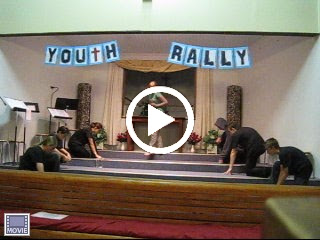The Americans formed The First Continental Congress to resist the embargo on Boston. All thirteen colonies sent delegates. It was soon apparent that the only way to gain their rights was to claim independence from Britain. They appointed George Washington the Command-in-Chief of the American forces in 1775. July 4, 1776, the Declaration of Independence was signed by some of the delegates, the vast majority signed later in August. By fixing their signatures to the Declaration they were signing their names in treason, and they all knew it. But they were resolved. "And for the support of this declaration, with a firm reliance on the protection of Divine Providence, we mutually pledge to each other our lives, our fortunes, and our sacred honor." [1] They put their trust in God and prayed for victory.
The British commander in Boston decided to try and break up the stockpiles of American weapons. He sent his army to seize a stockpile in Lexington. The Minutemen, local militia, rushed to meet the British. The leader of the British expedition ordered the Americans to disperse. They didn't. Someone, maybe British, maybe American, fired a shot and the Battle Lexington and the American Revolution started.
Washington left Mount Vernon to take command of the American army; he doubted his ability to win the war. "I do not think myself equal to the command I am honored with."[2] But it was the wish of his countrymen that he lead them, "and he did so, with an earnest desire not to disappoint their confidence, and an humble trust that he should have the blessing of God." [3]
The task before him was a hard one indeed. The British army was well trained and the soldiers seasoned, plus there was a lot of them. The American army, by contrast, was scantily armed and clothed. In addition to this, soldiers served short enlistment times, meaning the army was constantly changing its features. Washington wrote to Congress about the American army, "these situations are melancholy, but nevertheless true. I hope for better."[4]
The Americans enjoyed brief success at the start; they freed Boston and held their own at the Battle of Bunker Hill. The British controlled the seas and could land soldiers anywhere along the coast, however. One thing Washington had learnt from his time in the French and Indian War was that by avoiding pitched battle, a small band of troops stood a better chance of victory against a larger army.
Washington and the army stationed themselves at Long Island; where they anxiously awaited to be attacked. The British landed a large force on Long Island, trapping the Americans forces on the island. Washington was determined to avoid open battle when the odds were so against them. He also knew that if the American army was killed at Long Island, the hope for freedom would die with them. "The fate of unknown millions will depend, under God, on the courage and conduct of this army. Let us rely on the goodness of our cause, and in the aid of the Supreme Being."[5] He decided to evacuate the army from Long Island.
It was very risky; he would have to load his whole army onto boats and then get them pass the British warships to the Continent. As night approached they realized that, "a kind of Providence favored the Americans with a night so dark, and a morning so foggy, that though their enemies were within a hundred yards of them, they did not know the movement they were making until they were beyond the reach of their guns."[6] Washington was in the last boat to leave. There are many examples of God intervening for the Americans throughout the War. Rivers would suddenly flood as soon as the Americans passed over, stopping the British. Or storms would throw the British fleet off course and damage them. "For they never would have succeeded in defending their rights, unless the mighty hand of God had upheld and guided them."[7]
The British pursued Washington, who kept retreating. One officer, getting discouraged with always falling back, asked Washington how far they would run. He replied, "To Virginia, and if followed there, over the Alleghany Mountains, and try what we can do there." [8] The rest of the year went the same until winter. The British decided to winter at Princeton, New Jersey, and were warm and comfortable. The Americans sat out in the cold ; their suffering was great. Most of them didn't have shoes, and none of them had winter clothing; in addition, they didn't have much food. Morale was low, and so was reenlistments. Washington was concerned that there wouldn't be any enlistments in the spring. And so he formed a daring plan.
[1] Declaration of Independence
[2] Life of Washington (Anna C. Reed) p60
[3] Life of Washington (Anna C. Reed) p61
[4] Life of Washington (Anna C. Reed) p74
[5] Life of Washington (Anna C. Reed) p74
[6] Life of Washington (Anna C. Reed) p75
[7] Life of Washington (Anna C. Reed) p50-51
[8] Life of Washington (Anna C. Reed) p81
You cannot carry your cross while sitting on the fence
Remember Who We Are
Friday, May 28, 2010
Subscribe to:
Post Comments (Atom)
votejaredn29









No comments:
Post a Comment